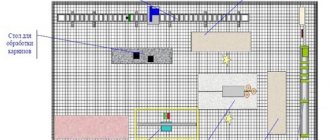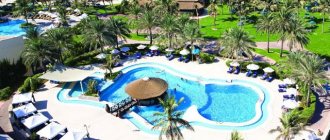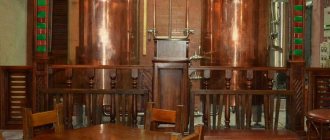For a long time, the hotel business existed not as an independent activity, but as an additional service at catering establishments, entertainment venues, postal stations and even churches. Of course, there was no need to discuss any level of service in this case - travelers spent the night in terrible conditions, often living next to bedbugs or even less pleasant roommates - rats.
Fortunately, these dark times are long gone, it has become easier for people to travel, and the development of accommodation facilities has played a significant role in this. Still, going to explore other cities and countries is much more pleasant when you are confident that you can spend the night in a warm bed.
At the present historical stage, the whole world is divided into two conditional camps: large chain hotels and small private hotels. Supporters of both types can argue until they are hoarse which is better, present arguments and quote famous historical figures. Let’s not get into the eternal argument and talk about what’s simpler
– mini-hotels.
This hotel format has become extremely popular in Western Europe and has gradually won 40% of consumers from its major competitors. The secret of the level of popularity of small accommodation facilities is quite simple: the fewer guests a hotel has, the easier it is for it to choose an individual approach to each of them. Large chain hotels are clearly not capable of this approach; remembering just the faces of all guests is already a great achievement for hotel workers, and knowing their names, preferences, and important family holidays without peeking at the guest card (if it is available and filled out) is generally unrealistic . But for mini-hotels, where there are few guests, it is not difficult to know everything about everyone, so the atmosphere there is more comfortable and homely, as if in a family where everyone is close and well acquainted.
Now that it’s clear why people choose small hotels, let’s now move on to what a mini-hotel actually is.
Requirements
In accordance with Russian legislation, a mini-hotel is a small accommodation facility with a capacity of 5 to 15 rooms.
There are no additional requirements for mini-format hotels. The set of furniture and equipment, the size of the rooms and the availability of communications - all this is no different from the requirements for medium and large enterprises.
The legislative framework for small accommodation facilities is still very meager and when starting a business you need to focus on the general requirements for hotels.
Like any type of business activity, a mini-hotel must comply with a whole list of regulatory documents. The basis only for opening a business with the wording “mini-hotel” will be:
- GOST R 54606-2011 Services of small accommodation facilities. General requirements.
- GOST R 50690-2017 Tourist services. General requirements
- Federal Law “On the Fundamentals of Tourism Activities in the Russian Federation” (as amended as of June 4, 2020).
- Decree of the Government of the Russian Federation of October 9, 2020 N 1085 “On approval of the Rules for the provision of hotel services in the Russian Federation.”
This list can be continued with laws, regulations and rules in the field of safety (sanitary-epidemiological, fire, environmental, etc.), advertising and business activities, etc....
It is also worth mentioning that opening a hotel is a long process, which, with the preparation of all documents, selection and reconstruction of premises, or even registration of a land plot, can drag on for several years. This is the saddest statistic when opening a business is hampered by numerous checks, inconsistencies and correction of one’s own mistakes. Even if you are lucky everywhere and in everything, there will be no problems or hiccups, it will take at least several months to open.
Payback in the hotel business also cannot boast of sky-high indicators. The norm for a mini-hotel is 5-10 years. This information is important to consider, since a lot of investments will be required, both during opening and during operation.
If none of the listed features of the hotel business scare you, then you can safely go to register your future source of income.
Possible risks
Risks in the hotel business are associated not only with its internal work, but with external factors:
- The economic crisis and, as a consequence, a drop in demand for services, an increase in prices for goods and equipment, and a decrease in the solvency of citizens.
- The emergence of new players on the regional market with more favorable conditions.
Economic risks are difficult to predict in advance and difficult to protect against. And you can fight competition - for example, by coming up with unique services. Some hotels now have “smart breakfasts” that activate the brain, an aroma menu with different aromatic oils, a menu of vinyl records, special rooms with toys for children, and even rooms with a bed and toys for dogs and cats. You can come up with your own “trick,” use it to attract guests and retain regular customers.
Business registration
Before registration, the urgent question arises about choosing the organizational and legal form for the hotel. You will have to choose between individual entrepreneurs and LLCs. Each has a number of advantages and disadvantages, but for a mini-hotel, individual entrepreneurship will be preferable. The main reasons for this are the simplified form of opening and, most importantly, closing a business, as well as reduced taxation and penalties.
The hotel business does not require a license, so registering an LLC only makes sense if the hotel will sell alcoholic beverages. At the same time, food services are not required for mini-hotels at all, or they can be provided by other enterprises. The practice of operating a restaurant at a hotel that has no legal connection with the hotel is widespread and justified.
To register an individual entrepreneur you will need:
- Prepare documents (copy of passport and registration application).
- Pay the state fee for registration.
- Submit documents to the tax office.
- Obtain a registration certificate and state statistics codes.
- Make a seal.
- Open a current account.
How to determine the profitability of a guest house
First you need to draw up a detailed business plan for the guest house. Even if you have your own plot of land in a suitable location and a capital building that does not require repairs, even if you plan to make do with your own funds and not take out loans, you will still need a business plan, which will become a kind of step-by-step action plan, cost estimate and forecast expected profit.
Make a list of the necessary documents that you need to obtain before opening your guest house: a certificate of state registration as an individual entrepreneur, documents confirming your ownership of the house and land, etc. If at this stage you have nothing but money and dreams of owning your own hotel business, you need to decide whether you will purchase a suitable property or build it from scratch.
There is no clear answer to this question. If you have a ready-made building for a guest house, your costs at the first stage will undoubtedly be lower. However, you will still have to spend money (and quite a lot) on repairs, redevelopment, additions, etc. In addition, you need to take into account that when converting an ordinary residential building into a guest house, you must comply with a number of requirements in accordance with building codes and regulations (SNiP), sanitary standards (SanPiN), departmental building standards (VSN).
When building a building from scratch, with the help of an experienced architect, you will be able to competently plan the area of the guest house, effectively using every square meter, and avoid many annoying mistakes that will darken the lives of your guests. Such possible shortcomings include, for example, windows facing a courtyard or a brick wall, a room located near the kitchen, etc.
The number of rooms in guest houses usually does not exceed ten. Moreover, at least half of them must be double rooms with the possibility of organizing an additional bed there (put a bed or folding bed). The other half of the rooms will be single (preferably also with the possibility of expanding by at least one bed). It is unprofitable to make rooms for a larger number of people: they take up too much space, which is already limited, and are in less demand than cheaper single and double rooms.
Selection of premises
Choosing the right premises for your future hotel is already half the success. It is better for a mini-hotel to be located in the business or cultural center of the city, so that the infrastructure around it is developed. Availability of transport is also very important, because not all guests will use taxi services.
It is also possible to choose a quiet residential area for a hotel, but then the main competitors will be apartments for daily rent, to which hotel rooms often lose out, unless a person is focused on impeccable service. The only reasonable option for a residential area would be to place a hotel in an apartment. However, finding a premises of the required size can be problematic, then you will have to buy several apartments, arrange large-scale redevelopment and deal with many authorities that will set the goal of slowing down the process or even try to prevent the opening of a business. In addition, such a hotel may not always have good neighbors. Accommodation in a residential building is an additional risk, because all the everyday problems of your neighbors will become your problems. Broken pipes, insects and gas leaks from neighbors - all this can cause harm to your guests, employees and property, and absolutely nothing will depend on you.
Based on this, it is better to give preference to free-standing buildings. If it is not possible to build it, you need to buy it. It is not justified to rent hotel premises, unless it is a long-term lease with the option to buy. Large financial investments will take years to pay off, and a short-term rental contract does not guarantee that the premises will be yours all this time.
The ideal option would be a building originally built as a hotel. You can do without redevelopment and limit yourself to repairs only. If the premises have historical value, then it is possible to leave everything “as is”, just do a general cleaning and bring in the furniture. Of course, such a hotel will be very specific, but there will always be those who like to touch history, even if it is expressed in peeling paint on the walls.
An important point: it is at this stage that it is necessary to decide whether the hotel will undergo certification and receive stars. This procedure is not mandatory; for mini-hotels it has little justification, but you need to think about it when choosing a room. After all, the assessment of a hotel’s “star rating” begins with the area of public premises and rooms. However, taking into account all the necessary infrastructure, it will be problematic to achieve a level above 3*.
Financial plan
There are two options for the development of events:
- Find a room of suitable size and rent it.
- Build a hotel from scratch.
We recommend purchasing only reliable furniture for your mini-hotel.
Of course, the first option will require less initial costs, but you will pay a significant amount every month, reducing your own income. The second option will require serious investments, but in the end you will have your own building in a convenient location, which can later be sold or rented out if you get tired of doing business.
Constructing your own building takes about two years. The estimated investment amounts are as follows:
- Obtaining permits, research and design work - 1 million rubles.
- Construction of the building, finishing - 10 million rubles.
- Improvement of the surrounding area, creation of your own parking lot - 1 million rubles.
- Purchase of furniture and equipment - 5 million rubles.
- Other expenses - 1 million rubles.
In total, building your own facility will cost you approximately 18 million rubles.
A year of hotel operation costs approximately 4.5 million rubles, of which:
- Taxes, wages - 2.5 million.
- Utilities, current expenses, purchase of linen, washing supplies, etc. - 1.5 million.
- Other expenses - 0.5 million.
The expected profit from the hotel is about 7.5 million rubles. Rooms with an average cost of 1000 rubles per day will bring you: 1000 * 20 * 30 = 600,000 per month or 7,200,000 per year at full occupancy (in practice, this figure is 10% less, since it is not possible to ensure 100% occupancy of rooms all year round quite simple). With proper organization, you will receive 6,500,000 million from the rooms and about another million rubles from the bar - gym. Net profit will be 7,500,000 - 4,500,000 = 3,000,000 rubles per year.
Note:
Our 3 million does not include rent for the building. If you are building your own, then these 3 million will be your net profit. If you rent it, then approximately another 1.5-2 million will need to be paid for rent.
It turns out that building a hotel from scratch will pay for itself in 5-6 years. A rental building with an income of 1 million per year will pay for itself in 5 years. Therefore, building your own is much more profitable. Or look for options with a mortgage - it’s better to pay off the debt for your building than just pay money for rent.
In a mini-hotel, the administrator can act as a security guard
Business plan
Having a business plan distinguishes a competent entrepreneur from an illiterate one. A business plan is a guide to action for managing and developing a business, as well as an excellent way to control the level of deviation of what is desired from reality.
A good business plan provides high-quality market analytics, predicts its changes and indicates the prospects for hotel development in this market. Of course, not all factors are taken into account and not all business plans are destined to come true. Sometimes external circumstances interfere with the successful development of a business, sometimes it is the entrepreneur himself. But having a business plan helps to take into account at least basic risks and think through ways to solve potential problems in advance.
Basically, only small entrepreneurs - owners of trade stalls and kiosks - can afford to abandon business planning. Everyone whose business is a more established enterprise prefers to plan everything in advance.
The final stage of drawing up a business plan for a hotel by the sea
In the previous paragraphs we did not mention utility costs. The area of our hotel is considerable, so approximately 65,000 rubles must be provided. In addition, every month you need to purchase consumables from the hotel - 30,000 rubles.
| Revenue | 2 500 000 |
| Rent | 200 000 |
| Payroll and taxes on it | 350 000 |
| Security | 15 000 |
| Loan payments | 250 000 |
| 40 000 | |
| Communal payments | 65 000 |
| Consumables | 30 000 |
| Income | 1 550 000 |
| Taxes according to the simplified tax system 15% | 232 500 |
| Net profit | 1 317 500 |
The monthly profit will be 1,317,500 rubles. In 4 hot months, with a hotel occupancy of 90%, you will earn 5,270,000. Use our example to formulate your business plan using a simple algorithm. And only after these estimates, go to a professional estimator for details.
(20429)
Design and renovation of premises
The design of the hotel must fully correspond to its theme and concept. If you decide to create an eco-hotel, you should make sure that all finishing materials are natural, as well as the furniture. If you are inspired by the ideas of minimalism, remember that there should not be less than the required list of items in the room - even if the bedside table does not fit into the concept, its presence is prescribed by GOST.
An original solution for mini-hotels - an individual theme for each room. However, such an interior will require more work, because each room is a new design. In this case, the designer’s services will cost much more.
Is it possible to think through a design without involving professionals? It is possible, but for this you need to have a sense of style, a clear idea of the future interior and specialized programs. Luckily, some design programs have free versions that can be found online. It usually takes no more than an hour or two to master basic skills: repainting walls, arranging furniture. You will spend much more on finding the necessary elements, such as seamless wallpaper of the desired shade, flower pots, etc. The result of many hours (most likely even many days for a beginner) of work will be either a ready-made design, from which you only need to buy everything you need and bring the picture to life, or frayed nerves and a firm decision to turn to a professional designer.
Production plan
Let's look at what it takes to open a hotel with 20 rooms. This is a classic size for a mini-hotel. The numbers should be divided as follows:
- 3 luxury rooms. Here it is necessary to make high-quality repairs, equip your own bathrooms, install all the necessary furniture and household appliances in the rooms, and create mini-kitchens.
- 13 rooms for classic double rooms. Moreover, make 7 rooms with two separate beds, 6 with double beds.
- Allocate 4 rooms for single rooms.
Purchase of equipment
What can generally be classified as hotel equipment? If the question causes confusion, let's list:
- Plumbing (both for rooms and for public use + for staff).
- Air conditioning system (in other words, air conditioners, if they are provided in rooms and administrative premises).
- Technical equipment (computers, phones, printers, scanners and other office equipment).
- Household equipment for rooms (TVs, telephones, kettles, hair dryers, irons and everything that you consider necessary to provide to your guests).
- Cleaning equipment (vacuum cleaners and other equipment).
The better the quality of the selected equipment, the longer it will last, but this does not mean that you need to invest a third of your entire budget in it. For example, modern professional cleaning equipment will be unreasonably expensive to clean a mini-hotel. Instead, it is quite possible to use options intended for home use.
Particular attention should be paid to the process of washing bed linen and towels. It is not always possible to organize a separate room for washing, drying and ironing, so a completely successful solution would be to enter into an agreement with a laundry service.
A hotel in a private home is a win-win option
Many novice entrepreneurs who want to minimize the level of initial costs are interested in how to open a hotel in a private home.
In this case, it is necessary to take into account that such a premises is intended not only for renting out rooms to guests, but also for the residence of the owners. Therefore, the residential part of a private house must be properly isolated from the hotel part - this must be taken into account at the initial stages of designing the building.
In terms of the number of floors of such a structure, three floors are most suitable - this will allow for approximately ten to fifteen rooms to be arranged, which will act as hotel rooms. The ideal option is for each room to have a separate bathroom and shower. The site on which a private house with a hotel will be located should be as comfortable as possible. It is desirable that there be a swimming pool, a garden, cozy gazebos, swings and much more that will contribute to a pleasant stay.
Now you know how to open your own mini-hotel, which will bring you a good profit. With impeccable quality of service and ideal comfort, customers will want to come back to you again and again.
Back to contents
Purchasing furniture
The choice of furniture is one of the most crucial moments for a hotel. Guests will never inquire about the hotel's ownership form, nor will they ask about the business plan or development prospects, but they will definitely remember the uncomfortable furniture. The same goes for pillows and mattresses. It's always a good idea to have a few pillow options on hand and give your guests a choice. You need to select orthopedic mattresses (hard ones are preferable to soft ones).
When choosing beds, you should pay attention to a strong base that will have to support many guests of different weight categories. This also applies to the rest of the furniture - it should be strong, but not too bulky, otherwise the maid will not be able to move it during cleaning. This is fraught with dust deposits in hard-to-reach places, which is unacceptable for a hotel.
In addition to the main furniture that will be placed in the hotel rooms and premises, additional furniture is also needed: couches, folding beds, cribs and high chairs. Such furniture is provided at the request of the guest; it is not used very often, but it should be available.
Features of the hotel business
In order to immediately determine the format of the business, it should be stipulated that the room capacity of a mini hotel, according to GOST, should be between 3-15 rooms. At the same time, a business can be implemented in several directions at once. This includes the creation of youth hostels and the opening of cozy family hotels. A 15-room hotel, which will attract the attention of business travelers and tourists, will be much more expensive for a novice businessman.
GOST also regulates the placement of a mini hotel only in a separate building with its own entrance. You may need an emergency exit - this will be determined by the Fire Inspectorate.
Features of the hotel business
A mini hotel can only be located in a non-residential building.
Purchasing software
Hotel software consists of a standard operating system and a small list of programs. If you get the operating system when you buy a computer, then you will have to worry about purchasing “R-keeper”, “Parus”, “KWHotel” or any other program or set of programs separately. Before purchasing, it is better to try the free version (many have this).
It is also important to evaluate the ratio of functionality and price. Sometimes for the same money they offer a room movement control system or a full range of programs, including reservations, accounting, warehouse accounting and much more.
There is also no shame in reading the instructions and asking questions to the support service. Remember that you (or your staff) will have to work with these programs, so it’s better to find out all the details in advance.
Opening a mini-hotel: regulatory requirements
Before you begin renovations, estimate the size of the areas. Calculate how many rooms you can make. Typically, this hotel format involves 5-10 rooms.
How to make a mini-hotel according to the rules
- According to GOST, a single room cannot be less than 9 m². In rooms designed to accommodate several guests, there should be 6 m² per resident.
- Minimum set of furniture: bed, wardrobe, table and chair, bedside table.
- For 10 residents there must be at least 1 shared bathroom and 1 shower.
What documents are needed for a mini-hotel
- Agreement with Sanitary and Epidemiological Supervision.
- License to operate in the service sector. Hotels do not require mandatory certification. But if there is a cafe or store on site that sells alcoholic beverages, an appropriate license and cash register will be required.
- Permission from the fire inspectorate.
Staff for a mini-hotel
To operate a business, you will need a small staff: an administrator, an accountant, 2-3 maids, a cook and a bartender (if there is a cafe), as well as a technician and a security guard.
As a rule, the administrator function is assumed by the business owner at the first stage. This reduces salary costs and also helps control and optimize expenses.
Recruitment
Personnel are the basis of business for the service sector. Whether guests return a second time or not depends on the friendliness, friendliness and professionalism of the employees.
When selecting personnel, it is important to be guided by the following rule: experience is required for responsible positions, but not for others. Hiring a maid without work experience is a common story, but the hotel director, if you do not plan to completely run the business yourself, must have experience in this area and in this position. Starting a business is not the time for experimentation.
The peculiarity of a mini-hotel is that the staff can be kept to a minimum - a manager, a couple of administrators, a couple of maids, an accountant and a handyman (aka mechanic, plumber and electrician).
If you are a workaholic or simply do not want to trust strangers, you can do all the work in the hotel yourself - such enthusiasts also exist, but you must remember that you are also a person and you need rest. It will not be possible to combine all employees without days off and vacations 24 hours a day and 7 days a week. The body will misfire sooner or later, it’s good if it’s not while working with an electrical panel or tax reporting.
Calculate your strength wisely and hire helpers!
Design Features
The main task that the layout of a private hotel solves is to provide guests with comfort and convenience. The layout inside is done so that staff and guests do not overlap. The laundry, warehouses, and kitchen are located in a separate wing of the building. Reliability and quality of communications play a special role.
The design of the room stock depends on the wishes and budget of the owner.
General criteria
Before purchasing a building and planning it, decide what criteria and parameters the object will have:
- capacity;
- purpose;
- level of comfort;
- location;
- price level;
- catering.
You may be interested in: The main differences between a cottage and a house
Documentation
To create a project, you need to collect documentation. Papers are divided into the following categories:
- Documents confirming ownership of the object;
- Certificate of an individual entrepreneur;
- Permits for the refurbishment of the project;
- Permits from regulatory authorities;
- A license for each type of additional service offered;
- Agreements of organizations servicing the complex (housing office, security agency, waste removal company);
- Registration of a cash accounting device;
- Registration and permission to place advertisements.
If you have any questions regarding paperwork, please contact your local tax authority.
Organizational aspects
The main organizational point at the initial stage of the hotel business is the collection of documents. The papers must confirm the rights to conduct business activities. For a guest house with a small number of rooms, it is enough to register an individual entrepreneur.
Before making a dream come true, the following conditions are met:
- acquisition of building and project;
- obtaining permission to transfer to a non-residential building;
- collection of documents from authorities (sanitary control, fire service);
- performing planning and repair work;
- personnel selection;
- advertising placement.
Criteria for choosing premises
When choosing a building, it is important to follow some rules:
- The premises should be located near train stations, bus stops, and airports.
- A building without cultural heritage, so that it would be possible to change the façade and interior plan. This will be clarified by the city government.
- Availability of accessible transport interchange, own parking lot, convenient access.
- Shops and catering establishments should operate nearby.
A worthwhile option for locating a guest house would be a separate building with a landscaped fenced area. It is allowed to carry out the layout of a hostel in a house or apartment.
Design development and arrangement of rooms
Factors that influence the price are the design and layout of hotel rooms. There should be nothing superfluous in the design of a middle or economy class establishment. It is better to make the layout inside the rooms modest, in a minimalist style. But it is desirable that the interior design be developed taking into account the design and policy of the hotel.
A promising concept in a mini-hotel would be when each room has a different style. This layout is labor-intensive and expensive, but it will arouse interest among visitors and will be able to provide a variety of rooms.
Advertising for a hotel is an important and slightly painful issue. Shooting videos and broadcasting them on television is ineffective; ordering advertising on radio is even more so. The only effective platforms for hotel advertising remain the Internet and printed materials.
With the Internet everything is more or less clear. You need an official website with beautiful pictures, videos, a virtual tour, prices, a list of services and everything that should be on the official website (don’t forget about contact details and address). Posts on social networks in various thematic groups are also required. It is possible to publish posts offering discounts on special conditions (book today and get a 5% discount) or simply advertising the hotel. Another important step is to include the hotel on tourist maps of specialized sites. Review sites and booking sites are the best advertisers on the Internet; you should never neglect their services, and even more so at first.
With printed information, things are a little more complicated. Distributing leaflets on the streets or through the mail is time-consuming and inconvenient. In addition, most of these flyers are simply thrown into the nearest trash can. At the same time, this is so far the most effective method after the Internet.
Marketing plan
You need to take care of how you will promote the service on the market long before the hotel opens. A plan must be drawn up that includes a detailed description of the proposed activities to popularize the service.
In this article we present classic marketing methods
- Partnership cooperation with travel companies.
- Own website. Today this is a prerequisite for the successful operation of any modern company. The Internet is one of the most effective advertising platforms today, surpassing traditional radio, newspapers and television in popularity. Your task is to ensure that the company’s website is in the top of search engines. To do this, you need to fill it with high-quality content: texts, photographs, videos. The website must provide information about services, reservations, etc.
- Part of a modern marketing strategy is the creation and maintenance of pages and groups on social networks. In order for as many potential clients as possible to learn about the existence of the hotel and become interested in it, it is necessary to create accounts on all social networks. These pages contain news, the possibility of online booking, a range of services and photographs, as well as other posts that motivate subscribers to stay at the hotel.
- Outdoor advertising. Take this factor into account especially if the hotel is located along the highway. Considering that tourists and people who are unfamiliar with the area will most often stay there, a clear guide should be given where they should follow to get to the hotel.
- Improvement of service. It is the service that determines the category of the hotel and works on its image. After analyzing the competitive environment and identifying the main players, be sure to think about what range of services you can offer your clients.
In order for a mini hotel to become popular and recognizable, it is necessary to choose a sonorous and meaningful name for it, and also create a unique logo. This data is placed on signs, business cards, leaflets and any promotional materials.
Important! Instagram, VK thematic group and YouTube channel are best suited for promotion.











